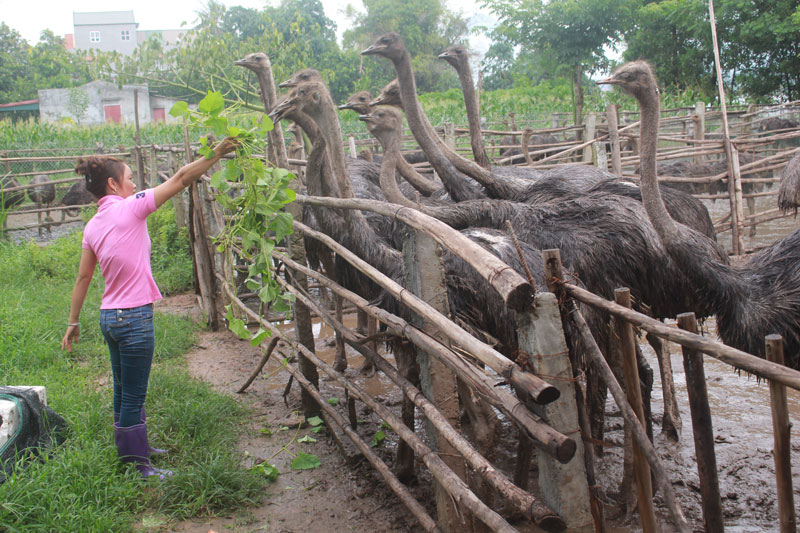
(HBO) - "Camel bird" is another name for an ostrich type that Phan Sy Hai and his wife Le Hai Yen raised in their farm at My village, Yen Mong commune, Hoa Binh city. Though they both have their own job, the couple took to raising this ostrich species in the hope of improving their income.

The ostrich farm of
Le Hai Yen and her husband in My village, Yen Mong commune, Hoa Binh city
generates a stable income of 100 – 150 million VND per year
In 2012, Yen’s
family bought six ostriches weighing 5-7kg each at 2 million VND each. They
then had to give up keeping the animals as they did not have enough land while
their children were young at the time. Three years later, the couple spent over
30 million VND to lease a 1,000 sq.m land plot and raised 30 ostriches. Seeing
that the birds grew well, required little care while adapting well to weather
conditions and resisting to diseases, Yen and her husband gradually increased
the flock to 60-100 heads, or even
200 in peak time. Currently, the farm has 120 birds
for meat and six for egg laying.
Yen said: "My family
raises ostriches mainly for meat and egg for sale. Female ostrich can lay eggs
when they reach 18-20 months old, but due to the lack of incubators and technique,
we now cannot hatch eggs to sell young birds. Therefore, we mainly raise the
bird for meat.” Yen now sells ostrich meat to local restaurants and at Nghia
Phuong and Tan Thanh markets. The prices of ostrich meat range from 100,000 –
250,000 VND per kg, 80-85,000 VND per kg for live bird and 250,000 – 280,000
VND per kg of ostrich meat pie. Each week, she sells two ostriches on Saturday
and Sunday or more when consumers place order. During peak time such as New
Year holiday or festivals, her farm sells four ostriches per day. With
affordable prices and fresh quality, the meat is becoming popular.
Yen stressed that
ostrich meat is organic, adding: "We feed the birds grass, water morning glory
and water-fern. During the raising process, the feed must be mixed in correct
ratio. When the birds are young, they should be fed with chicken feed, and when
they are bigger, we use grass and maize powder. While cleaning the farm, all
sharp, pointed and hard items must be removed to prevent the birds from eating them.
I buy young birds during January – June, around 100 heads each time”.
Yen and her husband
learnt how to raise ostriches from sellers or on the Internet. At the outset,
they met a lot of difficulties. Yen said: "Apart from limited capital, a lack
of experience worried us most. During transportation, many birds died along the
way. Little ones died due to weak resistance to diseases while bigger ones died
trampling upon each other. One time, I bought 12 ostriches but half of them
died on the way”. Learning from such experience, she transported the young
birds in small quantity at night in cool weather. The farm now earns her family a stable income
of 100 – 150 million VND a year, contributing to improving their livelihood./.
According to data from the Hoa Binh Provincial Party Committee, the industrial production index for the first six months of 2025 is estimated to have increased by 20% compared to the same period last year. This marks the highest year-on-year growth rate for this period since 2020.
In the first six months of 2025, Hoa Binh province’s export turnover was estimated at 1.145 billion USD, marking an 18.11% increase compared to the same period in 2024. Import turnover was estimated at $ 804 million, a 17.15% increase, which helped the province maintain a positive trade balance.
The lives of the ethnic minority farmers in Tan Lac district have gradually improved thanks to the new directions in agricultural production. This is a testament to the collective strength fostered through the professional associations and groups implemented by various levels of the district’s Farmers’ Union.
With the motto the "product quality comes first,” after nearly one year of establishment and operation, Muong village’s Clean Food Agricultural and Commercial Cooperative, located in Cau Hamlet, Hung Son Commune (Kim Boi district), has launched reputable, high-quality agricultural products to the market that are well-received by consumers. The products such as Muong village’s pork sausage, salt-cured chicken, and salt-cured pork hocks have gradually carved out a place in the market and they are on the path to obtaining the OCOP certification.
In the past, the phrase "bumper harvest, rock-bottom prices" was a familiar refrain for Vietnamese farmers engaged in fragmented, small-scale agriculture. But today, a new spirit is emerging across rural areas of Hoa Binh province - one of collaboration, organisation, and collective economic models that provide a stable foundation for production.
Maintaining growing area codes and packing facility codes in accordance with regulations is a mandatory requirement for agricultural products to be eligible for export. Recently, the Department of Agriculture and Environment of Hoa Binh province has intensified technical supervision of designated farming areas and packing facilities to safeguard the "green passport" that enables its products to access international markets.



